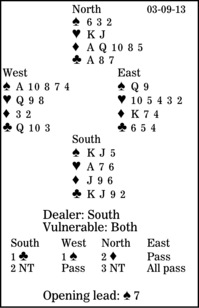Bridge column, March 9: To take or not, that is the question

How depressing if true. At the bridge table, when you are faced with two choices, you have to pick one of them or the game will grind to an unexpected stop! And often one choice will be successful.
In this deal, South is in three no-trump. West leads a fourth-highest spade seven and East puts up the queen. Declarer has two choices -- win trick one or duck it. Which should he select?
West's one-spade overcall would not meet with universal approval, but it is almost de rigueur among tournament players these days. Get into the opponents' auction, especially if you can bid spades. Then, they must go up one level to outbid you in a suit.
South starts with six top tricks: one spade (given the opening lead), two hearts, one diamond and two clubs. The extra tricks can be obtained from the diamond suit. And if that finesse is winning, declarer will win at least one overtrick. But what if the finesse is losing?
Then East might return a spade through South's holding, and West might cash four tricks in the suit. To try to stop that from happening, declarer should duck the first trick; let East take it.
East will return his second spade, but when he regains the lead with the diamond king, he will not have a spade left. Or, if he did, spades must be 4-3 and South would lose only three spades and one diamond.
** ** **
COPYRIGHT: 2013, UNITED FEATURE SYNDICATE
DISTRIBUTED BY UNIVERSAL UCLICK FOR UFS

